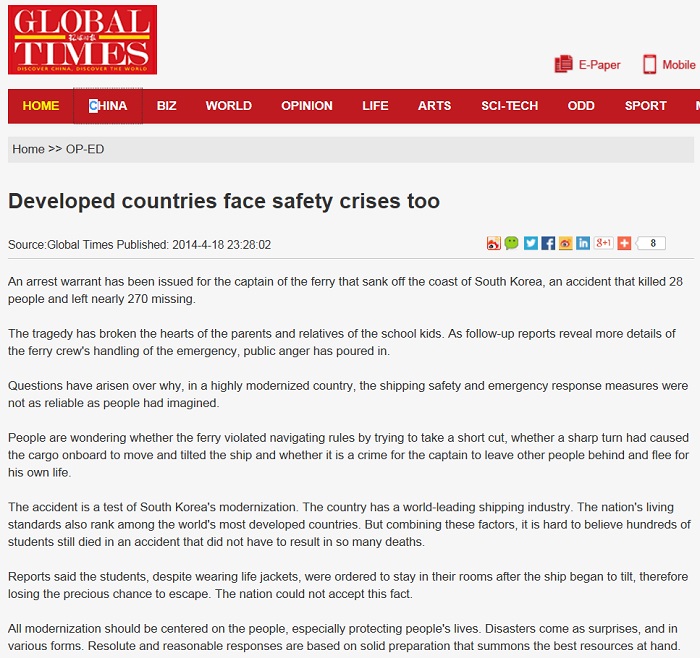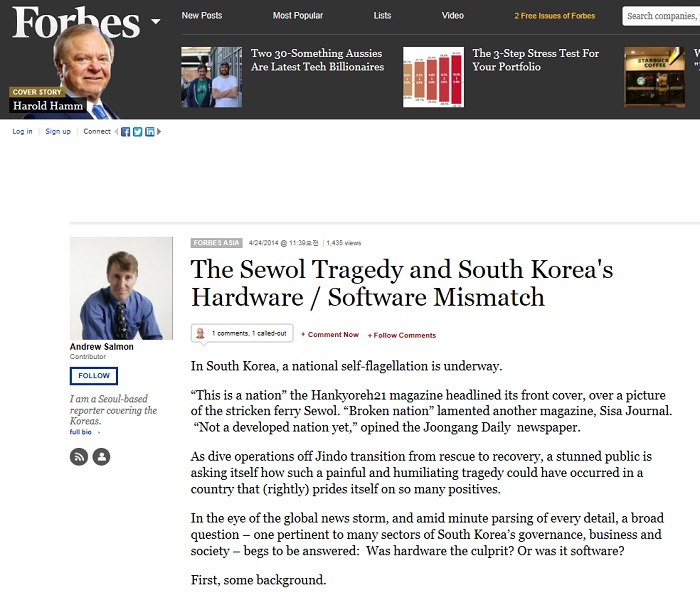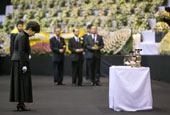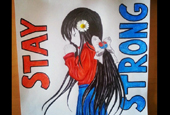It has been two weeks now since a ferry carrying hundreds of passengers, most of them high school students, capsized off the southwestern coast near Jindo Island.
This tragic accident has now been making headlines in the international press. Many news outlets see this tragedy as an avoidable, man-made calamity, caused mainly by elements closely related to the country’s rapid economic development.
The world has not only sent its condolences to the families and victims of the ferry accident, but has also raised the question about how the tragedy happened and many articles have critiqued the believed culprit behind the sinking.

First, the Global Times, a Chinese English-language newspaper connected to the People’s Daily, called the accident, “a test of South Korea’s modernization,” in an editorial published on April 18, titled “Developed countries face safety crises too.”
The article said that, “The South Korean disaster is a mirror. It reflects the limits and fragility of modern society.” It also pointed out that, “All modernization should be centered on the people, especially protecting peoples’ lives.”
The New York Times, the U.S.'s newspaper of record, also criticized the “moral hazard” shown by the captain and some of the crew who left passengers behind and fled for their own lives.

Meanwhile, Forbes, a U.S. business magazine, cited irresponsibility and breach of duty, which it argued is prevalent in the country’s business culture, as the main culprits.
In the eyes of many global media outlets, the main cause of the accident simply lies in having put expediency before thoroughness, an order of things that has allowed the nation to develop rapidly and to lift itself out of poverty.
The Asahi Shimbun, a Japanese daily, raised safety questions in its article of April 22, asking that, “Wasn’t there a negligent or greedy mindset, as profits or efficiency might have been put first over human safety? Doesn’t the nation’s focus on economic growth and competition leave human safety unattended?” The newspaper also emphasized that, “This kind of safety crisis is by no means an isolated issue.”
In the meantime, the Ming Pao, a Hong Kong daily, reported in its April 20 article, “What does the ferry disaster mean to South Korea?,” that, “Although it has already gone through so many man-made disasters over the years that claimed a lot of innocent lives, Korea still sees that kind of calamity happening.”
Another Japanese news outlet, the Mainichi Shimbun, expressed concern in its April 28 article, “The sinking of the ferry Sewol: May at least one life be rescued.” The newspaper said that, “The Japanese people should not allow this disaster facing our neighboring country just across the water to go unchallenged.”
Our country, whose people have been plunged into mourning and sorrow over the tragedy, not knowing how to cope with the unprecedented loss, is heartbroken, all while being baffled by the shower of criticism from global media. On the flip side, however, we do believe that many of the commentators out there are making legitimate and sincere assessments and that we all have much to learn from the huge loss.
As the Korean sayings go, "Bitter in the mouth, better for your health," or, "Good advice grates on the ear, but it may be beneficial."
We are humbly coming to terms with the appraisals and evaluations from our global brethren and with the advice coming from many foreign press outlets.
We are grateful to you all.
By Wi Tack-whan, Sohn JiAe
Korea.net Staff Writers
whan23@korea.kr
This tragic accident has now been making headlines in the international press. Many news outlets see this tragedy as an avoidable, man-made calamity, caused mainly by elements closely related to the country’s rapid economic development.
The world has not only sent its condolences to the families and victims of the ferry accident, but has also raised the question about how the tragedy happened and many articles have critiqued the believed culprit behind the sinking.

A captured image from the Global Time’s “Developed countries face safety crises too” article published on April 18.
First, the Global Times, a Chinese English-language newspaper connected to the People’s Daily, called the accident, “a test of South Korea’s modernization,” in an editorial published on April 18, titled “Developed countries face safety crises too.”
The article said that, “The South Korean disaster is a mirror. It reflects the limits and fragility of modern society.” It also pointed out that, “All modernization should be centered on the people, especially protecting peoples’ lives.”
The New York Times, the U.S.'s newspaper of record, also criticized the “moral hazard” shown by the captain and some of the crew who left passengers behind and fled for their own lives.

Forbes’ April 24 article, “The Sewol Tragedy and South Korea’s Hardware / Software Mismatch,” analyzes the cause of the recent ferry accident off the southwestern coast. (captured image from Forbes)
Meanwhile, Forbes, a U.S. business magazine, cited irresponsibility and breach of duty, which it argued is prevalent in the country’s business culture, as the main culprits.
In the eyes of many global media outlets, the main cause of the accident simply lies in having put expediency before thoroughness, an order of things that has allowed the nation to develop rapidly and to lift itself out of poverty.
The Asahi Shimbun, a Japanese daily, raised safety questions in its article of April 22, asking that, “Wasn’t there a negligent or greedy mindset, as profits or efficiency might have been put first over human safety? Doesn’t the nation’s focus on economic growth and competition leave human safety unattended?” The newspaper also emphasized that, “This kind of safety crisis is by no means an isolated issue.”
In the meantime, the Ming Pao, a Hong Kong daily, reported in its April 20 article, “What does the ferry disaster mean to South Korea?,” that, “Although it has already gone through so many man-made disasters over the years that claimed a lot of innocent lives, Korea still sees that kind of calamity happening.”
Another Japanese news outlet, the Mainichi Shimbun, expressed concern in its April 28 article, “The sinking of the ferry Sewol: May at least one life be rescued.” The newspaper said that, “The Japanese people should not allow this disaster facing our neighboring country just across the water to go unchallenged.”
Our country, whose people have been plunged into mourning and sorrow over the tragedy, not knowing how to cope with the unprecedented loss, is heartbroken, all while being baffled by the shower of criticism from global media. On the flip side, however, we do believe that many of the commentators out there are making legitimate and sincere assessments and that we all have much to learn from the huge loss.
As the Korean sayings go, "Bitter in the mouth, better for your health," or, "Good advice grates on the ear, but it may be beneficial."
We are humbly coming to terms with the appraisals and evaluations from our global brethren and with the advice coming from many foreign press outlets.
We are grateful to you all.
By Wi Tack-whan, Sohn JiAe
Korea.net Staff Writers
whan23@korea.kr

